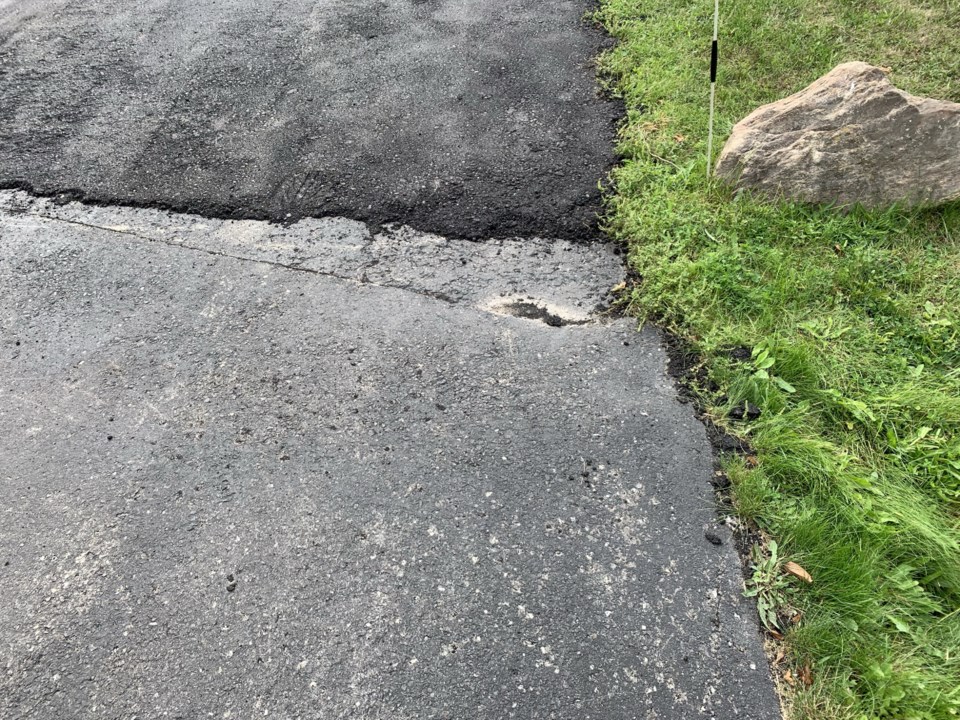The Better Business Bureau (BBB) is warning about paving scammers, with reports of activity all over B.C., including in Richmond.
Since the start of summer, BBB’s Scam Tracker has received almost 30 reports of unscrupulous contractors who trick homeowners with supposedly good deals.
Homeowners end up with shoddy paving work, or nothing at all, with some people paying more than $8,000.
The scam works by a “contractor” leaving a pamphlet or showing up at the door, claiming they have been doing work in the area and just happened to notice the condition of your driveway or sidewalk.
According to the BBB, the scammer will claim to be able to give you a discount as they “are already working nearby” and will usually ask for a large percentage of the fee or the total amount up front.
Once they have received the money, the scam contractor may promise to start the job within a few days and then disappear completely.
There have been instances when the work was completed but totally shoddy and any attempts to follow up to rectify the job are futile as the contractor gave out false information.
One of the recent instances in Richmond, say the BB, led to a potential victim asking too many questions of the contractor.
“A young man came to our door offering to re-do the tar coat on our driveway,” the Richmond resident told the BBB.
“The price was high but we have been wanting it done for a couple of years - the local person that normally does it is always too busy.
“But when we started asking question about his business and experience, the answers did not give us any confidence.
“He was forcing us to take the deal, changing the price a few times and that made us very uncomfortable.
“So we said no and asked him to leave. He drove off in a big grey van with no company name on it. Something wasn’t right so just sharing this just in case it is a scam.”
Someone from elsewhere in B.C. not so fortunate lost out on $5,500.
“They pressured me into letting them asphalt my driveway. They asked for cash and I gave them $5500.
“The job was completed within the hour and when I called the following day for them to return to discuss issues with the driveway, the line was busy.
“They also worked on my neighbour’s driveway and collected GST from them but not from us.
“They put asphalt directly on the neighbour’s ground without a proper base layer or herbicide for grass or weeds. They claimed to have their head office in Calgary with offices in Vancouver, Regina and Winnipeg. When I searched their local address, it was a UPS store.
“They say there's a guarantee and the company has been around for 1/2 century but when you navigate to their website, it is a copycat web page from another asphalt company.
“For a business that has been operating for this long and is reputable, you would think there would be advertising on the vehicles and there wasn't any. They operate without a license and also don't have any WorkSafe information.”
How to avoid contractor scams:
• Be wary of unsolicited offers. Most scams involving contractors begin when a random contractor makes an effort to go out of their way to offer an estimate that was never asked for.
• Research companies and contractors before you hire. Start with BBB.org. If the contractor has multiple negative reviews and complaints, reconsider hiring them. Often, a simple internet search will reveal companies or individuals that have been involved in fraudulent activities or provided unsatisfactory work to previous clients.
• Get everything in writing. Ask for an estimate in writing before payment is even discussed. Don’t let a contractor start working on a project until a written, signed contract outlining start and complete dates, a detailed description of the work to be provided, material costs, payment arrangements, and warranty information is provided.
• Stagger payments. Most contractors will require a percentage of the total price up front, but it should never be the full price before the work has begun. Instead, make an agreement to stagger payments, so work can be inspected at various stages of the project.
• Use safe payment methods. Paying with a credit card provides some peace of mind since the credit card company will likely offer some recourse if the company is fraudulent. Cheques are also a safe way to pay. Write them out to a company, not an individual. Paying by cash or using an electronic wallet app is risky, since there is no way to stop the payment or get cash back if anything goes wrong.





